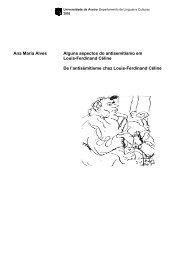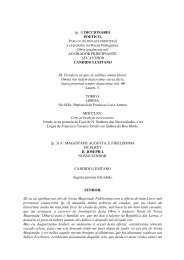- Page 1 and 2:
Joaquim da Silva Universidade de Av
- Page 3 and 4:
To Antonio, who made this possible.
- Page 5 and 6:
Acknowledgements This long journey
- Page 7 and 8:
Finally, I owe a huge debt of grati
- Page 9 and 10:
keywords abstract Film Noir, genre,
- Page 11 and 12:
2 Social and Political Influences o
- Page 13 and 14:
2.4 Joseph H. Lewis................
- Page 15 and 16:
Figure 42. Force of Evil ..........
- Page 17 and 18:
I. Introduction: Paving the Way for
- Page 19 and 20:
term that the film industry itself
- Page 21 and 22:
about which films themselves consti
- Page 23 and 24:
also, in the films’ fundamental n
- Page 25 and 26:
American films after the Nazi occup
- Page 27 and 28:
we also find a disruption of the wo
- Page 29 and 30:
oth in these French productions of
- Page 31 and 32:
Hollywood feature films but it did
- Page 33 and 34:
throughout this work); and c) to di
- Page 35 and 36:
odies, or as killers and crooks, bu
- Page 37 and 38:
these films was to confer on them a
- Page 39 and 40:
writer, director, producer, and art
- Page 41 and 42:
cinema does not have the power of
- Page 43 and 44:
Before working on The Dark Mirror,
- Page 45 and 46:
y taking it “from the outside.”
- Page 47 and 48:
and many, if not most, films would
- Page 49 and 50:
1.1.1 Dashiell Hammett In 1929, Das
- Page 51 and 52:
tough appearance, by their occupati
- Page 53 and 54:
Apart from “The Continental Op”
- Page 55 and 56:
unsettling when for example shootin
- Page 57 and 58:
1.1.2 Raymond Chandler Raymond Chan
- Page 59 and 60:
Figure 4. The Big Sleep the chaotic
- Page 61 and 62:
eleased to the big screen by MGM wi
- Page 63 and 64:
most fastidious visions of London i
- Page 65 and 66:
hometowns and move into bigger citi
- Page 67 and 68:
Double Indemnity started the trend
- Page 69 and 70:
has happened, but, as if hypnotized
- Page 71 and 72:
destructive, or used by stronger wo
- Page 73 and 74:
Tomorrow Goodbye (1950) into a noir
- Page 75 and 76:
Home (1937) - were two living proof
- Page 77 and 78:
which collapses the distinction bet
- Page 79 and 80:
Figure 10. Deadline at Dawn Alex’
- Page 81 and 82:
1.1.6 William Riley Burnett Another
- Page 83 and 84:
Figure 11. High Sierra The Asphalt
- Page 85 and 86:
1.1.7 Conclusions What made the det
- Page 87 and 88:
fiction managed to provide for a de
- Page 89 and 90:
escalation in illegal drinking plac
- Page 91 and 92:
Ben Hecht story and despite being p
- Page 93 and 94:
Mercy! Is this the end of Rico?”
- Page 95 and 96:
The third originating gangster movi
- Page 97 and 98:
part of the recurrent patterns of v
- Page 99 and 100:
protagonist of Edgar Ulmer’s Deto
- Page 101 and 102:
exemplify in Part III (“Space and
- Page 103 and 104:
1.3 The Gothic Romance 87 And trave
- Page 105 and 106:
titlecard when the film opens alert
- Page 107 and 108:
In Rebecca the beautiful, desirable
- Page 109 and 110:
forties. Thematically, the represen
- Page 111 and 112:
To complicate this matter further,
- Page 113 and 114:
trampled under by war and revolutio
- Page 115 and 116:
he says, when Expressionism ended,
- Page 117 and 118:
These early Expressionist films, wi
- Page 119 and 120:
student, Balduin (Paul Wegener hims
- Page 121 and 122:
(Tragedy of the Street, 1927, aka W
- Page 123 and 124:
plots with calculating precision. G
- Page 125 and 126:
perverted and neurotic sex murderer
- Page 127 and 128:
1.5 French Poetic Realism Poetic Re
- Page 129 and 130:
(Michèle Morgan), whose godfather
- Page 131 and 132:
strikingly atmospheric view of the
- Page 133 and 134:
Jean Paulhan, editor of La Nouvelle
- Page 135 and 136:
Julien Duvivier’s Pépé Le Moko
- Page 137 and 138:
the combination of lighting effects
- Page 139 and 140:
peculiar expressionistic lighting a
- Page 141 and 142:
Figure 28. Son of Frankenstein This
- Page 143 and 144:
Figure 29. Murders in the Rue Morgu
- Page 145 and 146:
alienation mixed with nuanced perfo
- Page 147 and 148:
2 Social and Political Influences o
- Page 149 and 150:
Liberal reforms soon became a spuri
- Page 151 and 152:
Polonsky, Jules Dassin, and Edward
- Page 153 and 154:
which are themselves historical eve
- Page 155 and 156:
Production Code Administration. Thi
- Page 157 and 158:
In this particular case, one can se
- Page 159 and 160:
Neff: Will you be here too? Phyllis
- Page 161 and 162:
against any possible theft of groce
- Page 163 and 164:
2.3 Postwar Readjustment If the moo
- Page 165 and 166:
In this group of films, the bleak a
- Page 167 and 168:
explain, these noir heroes of the f
- Page 169 and 170:
(Gilda, White Heat, Scarlet Street,
- Page 171 and 172:
seething excitations” and adds th
- Page 173 and 174:
Romanticism present at the very hea
- Page 175 and 176:
to persist and overcome difficultie
- Page 177 and 178:
III. Noir Thematics 1 Essential Ele
- Page 179 and 180:
its modernist sensibility, enabled
- Page 181 and 182:
Wyatt), cooks breakfast, domestic r
- Page 183 and 184:
structures of constituted authority
- Page 185 and 186:
1.2 Space and the Noir City Film no
- Page 187 and 188:
other people and developing a calcu
- Page 189 and 190:
I am the city. Hub and heart of Ame
- Page 191 and 192:
1.3 Trouble With Girls: The Femme F
- Page 193 and 194:
intelligent and powerful, if destru
- Page 195 and 196:
significant discussion of film noir
- Page 197 and 198:
Nevertheless, the message is quite
- Page 199 and 200:
Another example of the evolution of
- Page 201 and 202:
deceiving women. Like many of their
- Page 203 and 204:
Either as a femme fatale or an homm
- Page 205 and 206:
1.5 Dazed and Confused: The Voiceov
- Page 207 and 208:
an impersonal “you” giving the
- Page 209 and 210:
of war veterans who, unfolding thei
- Page 211 and 212:
1.6 Noir Atmospherics: Cinematograp
- Page 213 and 214:
John Alton’s highly stylised phot
- Page 215 and 216:
Figure 41. Stranger on the Third Fl
- Page 217 and 218:
indoctrination in the movie in the
- Page 219 and 220:
in the popular imagination. While t
- Page 221 and 222:
1.7 Sounds of the City: Jazz Soundt
- Page 223 and 224:
music, combines with images of patr
- Page 225 and 226:
Figure 45. Out of the Past Non-dieg
- Page 227 and 228:
ealm of near-explicit sexual metaph
- Page 229 and 230:
the two, affirming that “Jazz is
- Page 231 and 232:
City, Paramount’s Union Station a
- Page 233 and 234:
In my analysis of The Big Combo in
- Page 235 and 236:
Consequently, in the fifties, we st
- Page 237 and 238:
2 Noir and the Film Auteur 2.1 Aute
- Page 239 and 240:
noticeably the case, for example, w
- Page 241 and 242:
point out the fact that it is only
- Page 243 and 244:
elationship to the way a director t
- Page 245 and 246:
2.1.1 Billy Wilder Billy Wilder pla
- Page 247 and 248:
performance is full of understated
- Page 249 and 250:
Figure 54. Sunset Boulevard Wilder
- Page 251 and 252:
Figure 55. Ace in the Hole All of B
- Page 253 and 254:
2.1.2 Orson Welles He may have only
- Page 255 and 256:
For example, in the scene above (fi
- Page 257 and 258:
As Leo Braudy in The World in a Fra
- Page 259 and 260:
slanting compositions, and brillian
- Page 261 and 262:
2.1.3 Otto Preminger Austrian film
- Page 263 and 264:
plans, June still shows her love fo
- Page 265 and 266:
Figure 61. Where the Sidewalk Ends
- Page 267 and 268:
project my viewpoint on the audienc
- Page 269 and 270:
postulated as the “doctrine of si
- Page 271 and 272:
pouvait espérer sortir de la déno
- Page 273 and 274:
I am at the barber's, and a copy of
- Page 275 and 276:
certain community, our subjective r
- Page 277 and 278:
interpretant” (Stam 1992:6). Here
- Page 279 and 280:
The notion of “text” as a disco
- Page 281 and 282:
only agree that these disciplines s
- Page 283 and 284:
2 The Universe of Motifs and Symbol
- Page 285 and 286:
Andrew Sarris once wrote that “If
- Page 287 and 288:
exception to this rule, his movies
- Page 289 and 290:
independent production companies in
- Page 291 and 292:
Figure 66. Double Indemnity In the
- Page 293 and 294:
Figure 67. Scarlet Street The symbo
- Page 295 and 296:
contorted Expressionistic grimace,
- Page 297 and 298:
Figure 70. Metropolis The clock mot
- Page 299 and 300:
Figure 71. Strangers on a Train The
- Page 301 and 302:
“When I was young I wanted to be
- Page 303 and 304:
themselves in the projection of inn
- Page 305 and 306:
woman in the portrait throughout I
- Page 307 and 308:
scenes as the attachment is purely
- Page 309 and 310:
(namely The Spiral Staircase and Ou
- Page 311 and 312:
Chris meets by accident, is a hellc
- Page 313 and 314:
2.1.1.4 Conclusion All in all, ther
- Page 315 and 316:
Question: Scarlet Street had the sa
- Page 317 and 318:
an accepted and well-known screenwr
- Page 319 and 320:
Siodmak’s next two films for Univ
- Page 321 and 322:
money from Dundee. A more harrowing
- Page 323 and 324:
2.2.1 The Spiral Staircase (1946) a
- Page 325 and 326:
here increased by the unsteady blac
- Page 327 and 328:
Figure 83. The Spiral Staircase Thi
- Page 329 and 330:
Warren, making either of them the p
- Page 331 and 332:
2.2.1.2 The “Optical Unconscious
- Page 333 and 334:
camera is expressive, as it informs
- Page 335 and 336:
ordering” - appears to match this
- Page 337 and 338:
eyewitness, but at the same time, a
- Page 339 and 340:
Figure 87. The Spiral Staircase Bas
- Page 341 and 342:
While Cross implicitly acknowledges
- Page 343 and 344: Figure 89. Affair in Trinidad Other
- Page 345 and 346: However, much of this iconography t
- Page 347 and 348: long, wooden staircase while trying
- Page 349 and 350: Figure 93. The Spiral Staircase Fig
- Page 351 and 352: of Nathaniel Hawthorne’s “The B
- Page 353 and 354: almost part of a game, emphasising
- Page 355 and 356: 2.3 Jacques Tourneur Born in Paris
- Page 357 and 358: a laughing audience), and broken la
- Page 359 and 360: violent mishaps could have led to h
- Page 361 and 362: writers like Dashiell Hammett (who,
- Page 363 and 364: Chuck Tatum, a cynical, frustrated
- Page 365 and 366: on, Ann, who represents his hope fo
- Page 367 and 368: This kind of temporal manipulation
- Page 369 and 370: ought forward by the characters of
- Page 371 and 372: found Kathie: “I was glad it was
- Page 373 and 374: Figure 102. Out of the Past In this
- Page 375 and 376: Figure 104. The Lady from Shanghai
- Page 377 and 378: Jeff: Give him time. Kathie: You ar
- Page 379 and 380: Figure 106. Out of the Past The sce
- Page 381 and 382: Gun Crazy, a barrage of police gunf
- Page 383 and 384: 2.4 Joseph H. Lewis Considered as a
- Page 385 and 386: untold storied of ordinary men and
- Page 387 and 388: through windows, to provide the ind
- Page 389 and 390: 2.4.1 The Big Combo (1955) and the
- Page 391 and 392: of most noir films including The Bi
- Page 393: 2.4.1.1 “First is First and Secon
- Page 397 and 398: It is not only in terms of narrativ
- Page 399 and 400: Although the idea is not to go into
- Page 401 and 402: Figure 113. Scarlet Street Neff’s
- Page 403 and 404: 2.4.1.2 The Big Combo and Generic T
- Page 405 and 406: and knowing they are both surrounde
- Page 407 and 408: As the noir movement entered the la
- Page 409 and 410: V. Conclusions: 1 Genre Revisited T
- Page 411 and 412: on social aspects through a dramati
- Page 413 and 414: Buscombe is right: if we take a gen
- Page 415 and 416: constructions that make it difficul
- Page 417 and 418: Such factors have been scrutinised
- Page 419 and 420: Thematically, noir films as a group
- Page 421 and 422: While enforcement of the Production
- Page 423 and 424: are “as often nihilistic, cynical
- Page 425 and 426: which is normally not associated wi
- Page 427 and 428: morality brought about by these noi
- Page 429 and 430: It is within this cinematic and cri
- Page 431 and 432: ____________ (1994). The Semiotic C
- Page 433 and 434: ____________ (1992b). Farewell, My
- Page 435 and 436: E Easthope, Antony (1993). Contempo
- Page 437 and 438: Greenberg, Joel & Higham, Charles (
- Page 439 and 440: James, David E. (2005). The Most Ty
- Page 441 and 442: Malkiewicz, Kris (1986). Film Light
- Page 443 and 444: N Naremore, James (1978). The Magic
- Page 445 and 446:
Polan, Dana (1986). Power and Paran
- Page 447 and 448:
____________ (2006). Ava Gardner:
- Page 449 and 450:
Sullivan, Ellie (1986). Jacques Lac
- Page 451 and 452:
Wilson, Edmund (1962). Classics and
- Page 453 and 454:
Appendix I: Annotated Filmography T
- Page 455 and 456:
Beware, My Lovely RKO 1952. Prod: C
- Page 457 and 458:
Christmas Holiday Univ 1944. Prod:
- Page 459 and 460:
Dark Corner, The Fox 1946. Prod: Fr
- Page 461 and 462:
Framed Col 1947. Prod: Jules Schern
- Page 463 and 464:
House on 92 nd Street, The Fox 1945
- Page 465 and 466:
Killing, The UA 1956. Prod: James B
- Page 467 and 468:
Mildred Pierce WB 1945. Prod: Jerry
- Page 469 and 470:
One Way Street Univ 1950. Prod: Leo
- Page 471 and 472:
Repeat Performance EL 1947. Prod: A
- Page 473 and 474:
Stranger, The RKO 1946. Prod: S.P.
- Page 475 and 476:
Unsuspected, The WB 1947. Prod: Cha
- Page 477 and 478:
B) Other Relevant Filmography The f
- Page 479 and 480:
Last Laugh, The ScreenSound 1924. P
- Page 481 and 482:
Appendix II The Motion Picture P
- Page 483 and 484:
VIII. Religion 1. No film or episod
- Page 485 and 486:
B. By reason of the mobility of fil
- Page 487 and 488:
Reasons Underlying the Particular A
- Page 489 and 490:
VIII. Religion The reason why minis
- Page 491 and 492:
146, 152, 186, 192, 229, 250, 298,
- Page 493 and 494:
high-contrast, 11, 46, 172 Highway
- Page 495 and 496:
350, 352, 353, 354, 356, 357, 359,
- Page 497:
Walsh, Raoul, 56, 57, 66, 73, 223,

















